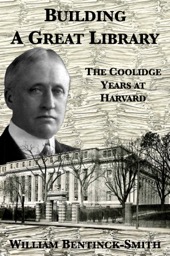 $9.99 on Kindle, Nook, Apple Books, Kobo, Google Play
$9.99 on Kindle, Nook, Apple Books, Kobo, Google Play(cover by Susan Erony)
Building A Great Library: The Coolidge Years at Harvard by William Bentinck-Smith (98,000 words, 45 illustrations)
“Archibald Cary Coolidge [1866-1928]... was born into fortunate circumstances and could easily have spent his years in respectable indolence. In his formal boyhood schooling in a variety of educational institutions he showed no particular early promise of orderly thought and study. But he came alive at Harvard College... [H]e returned to his college, after rigorous study and stimulating travel in Europe, to make a memorable career as a professor of history and international affairs, as a teacher of scholars, as an academic man of affairs, and as the director of a great library.
From childhood an instinctive, voracious reader, Coolidge early converted his enthusiasm for books into a deep concern for their use in the world of learning. As a young instructor and assistant professor, he searched out and bought scarce and important titles in his fields of interest and gave them to Harvard. His disciplined mind could not tolerate the crowding and disorder imposed on the Harvard Library by a combination of years of forced economy and haphazard growth. President A. Lawrence Lowell made no mistake in selecting his cousin Archibald Coolidge to help him find a solution to the library crisis Lowell had inherited from his predecessor.
Coolidge took over with characteristic energy and enthusiasm. Whether he could have succeeded so completely had not tragedy struck the Widener family [Harry Elkins Widener, scion of two of the wealthiest families in America, Harvard ‘07, accomplished bibliophile despite his youth, died in the 1912 sinking of the Titanic; his father also perished, but his mother survived and gave to Harvard the funds to build the Harry Elkins Widener Memorial Library] is problematical. With the great Widener gift the question of space was settled for a generation, and Coolidge could bring his common sense to bear on the library’s administrative problems and concentrate his acquisitive talents on the strategy of scholarly collecting.
Unsparing of himself and unfailingly generous in the cause of books and scholarship, Coolidge built wisely on the solid foundations of the past. He vastly extended the scope of the library’s collections and left a heritage of strength to the next generation, making possible the bold new departures in historical and international studies which followed the second World War.” — William Bentinck-Smith, Preface to Building A Great Library
“[A] detailed description of Coolidge’s achievement in building a great and well-organized collection and one of the great libraries of the world... Bentinck-Smith has succeeded in making the building of a library fascinating. He provides excellent biographical footnotes... this is an elegant and important study in a greatly neglected field.” — Robert F. Byrnes, The Journal of American History
“Building a Great Library is the story of [Coolidge’s] contribution. It is also of necessity the story of the man, a biography with emphasis on his life’s work. It is told with meticulous scholarship and literary style... an outstanding biographical work and a singularly important study of collection building.” — Arthur T. Hamlin, The Journal of Library History
“Mr. Bentinck-Smith has carefully documented the many significant contributions which Coolidge had made as teacher, administrator, scholar, and collector... a book that should be carefully read by anyone interested in research libraries and learning. Mr. Bentinck-Smith’s work is an important contribution to American library history.” — Philip J. McNiff, The New England Quarterly
“By telling us so much, Bentinck-Smith highlights once again how much we need a professional history of our premier academic library that will describe, analyze, and generalize Harvard’s experience as it illustrates or contrasts with the typical university library experience in the United States.” — W. L. Williamson, The Library Quarterly: Information, Community, Policy



